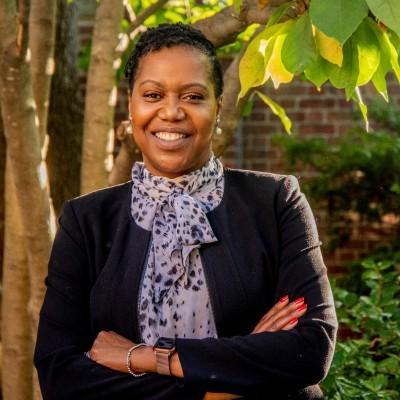When Kim P. Gunter, the vice president and chief compliance and privacy officer at Drexel University, addressed the audience at the Medical Center’s New Research Building, she aimed to peel back the layers of biases in the healthcare system and advocate for building relationships based on trust.
Gunter’s Feb. 23 talk, titled “African-Americans in Healthcare: Privacy, Consent, and Trust,” began with her sharing common sentiments that African Americans may bring with them as they walk into healthcare facilities, including the idea that the doctor-patient relationship is only a “white phenomenon,” or that they will be used as research subjects against their will. She noted that this lack of trust is only the tip of the iceberg.
Gunter shared the reality that African Americans die earlier from high blood pressure, stroke and heart disease than white people do. She noted that the maternal death rate among Black or African American women was nearly three times higher than that of white women in 2021, according to the U.S. Government Accountability Office.
Gunter said these statistics show that being Black is a public health crisis, a fact she described as being inextricably linked to the history of trauma, abuse and exploitation forced upon the African American community by individuals and entire institutions.
“History is not just privately funded research,” Gunter said. “It is publicly funded research, U.S government funded research, using Black bodies for experimentation and then drawing conclusions that limit the ability of African Americans in this country to thrive.”
According to Dr. Edilma Yearwood, former chair of the department of professional nursing practice at Georgetown and the current senior advisor for diversity, equity, inclusion, belonging and anti-racism, being cognizant of the history of medical racism is critical for guiding our current practices.
“We need to know the history because if we don’t know the history, we’re doomed to repeat or to treat people not based on what we know about their experiences,” Yearwood said in an interview with The Hoya.
Dr. Roxanne Mirabal-Beltran, an assistant professor at the School of Nursing and an attendee of Gunter’s talk, said that understanding this history can be a catalyst for change.
“Once that history and those lived experiences are acknowledged, then we can turn more earnestly to the work of dismantling the structures that no longer serve us or the communities we work to serve,” Mirabal-Beltran told The Hoya.
According to Gunter, the history stretches back to slave experiments, such as performing gynecological operations on enslaved women without anesthesia.
Gunter said the current stigma associated with mental health in the African American community also finds its roots in slavery, becoming ingrained in today’s medical biases.
“When you are subject to that, generation after generation, you take that on,” Gunter said.
Yearwood, who is also a clinical nurse specialist in child and adolescent psychiatric nursing, said the stigma stems from a lack of awareness of how mental health challenges manifest.
“So the stigma is there because we don’t understand the behaviors, and when we don’t understand the behaviors, we tend to be less tolerant of what we see in people; we stay away, or we make fun of them, or we ignore them,” Yearwood said.
These biases can result in false interpretations and labeling, even affecting the ways a provider interprets one’s pain level, Gunter said.
“A scale of one to ten may make sense, but how I identify that, and then how you interpret it is a barrier for me, because maybe I really do have that level of pain and I’m not looking for drugs, I’m looking for relief,” Gunter said.
To combat these biases, Gunter said that not only is more representation in healthcare needed, but also more trust. Based on her experience as a compliance officer, Gunter said the right to choose how one’s personal information is used and to know all the risks and consequences of a certain procedure are part of this foundation of trust.
“Very often, the reason that they think their rights have been violated is because the conversations or relationships with their providers have broken down,” Gunter said.
Gunter’s main solution to building trust is treating each interaction with an individual as an opportunity to further the relationship.
Yearwood, who teaches a unit on therapeutic communications to nursing students, said that simple actions, such as sitting close to the patient at eye level and listening to their concerns without distraction, can make a difference.
“If we want to engage our patients, we better have a relationship with them that’s based on transparency, honesty and a real genuine desire to know who they are as people,” Yearwood said.









